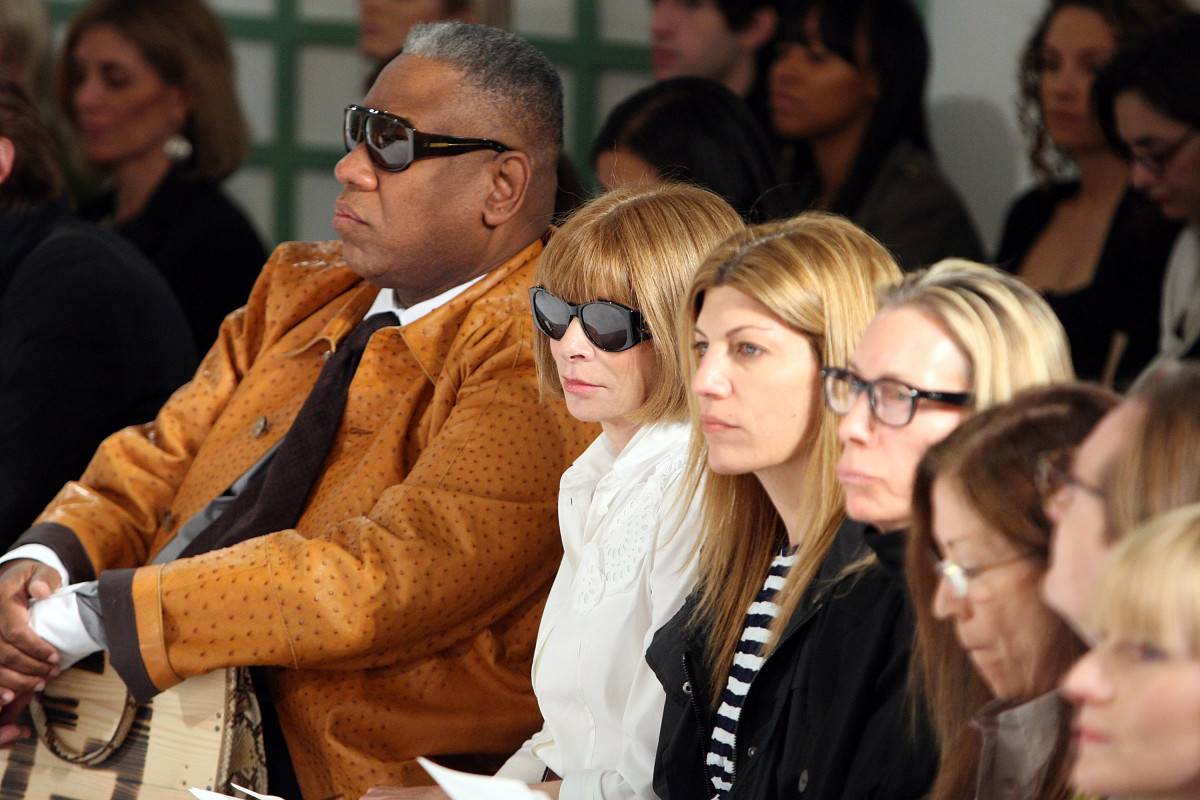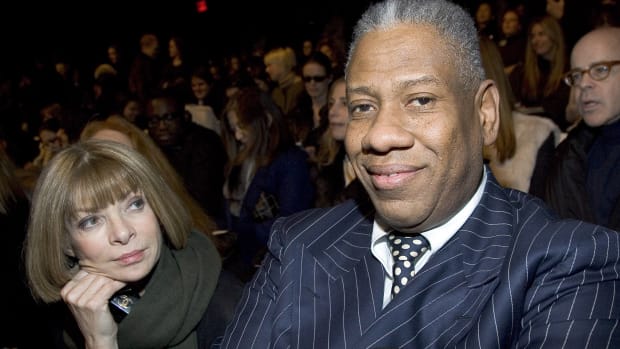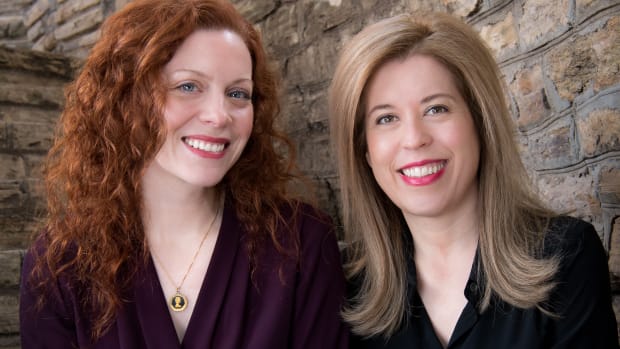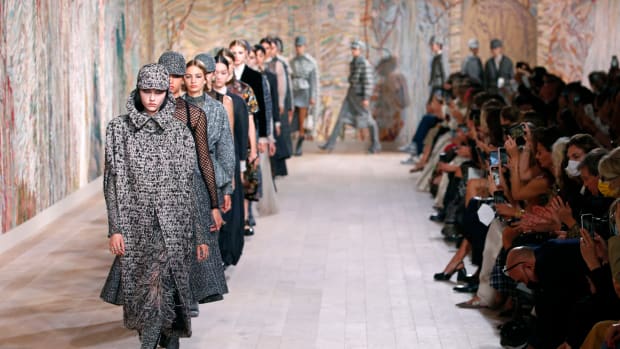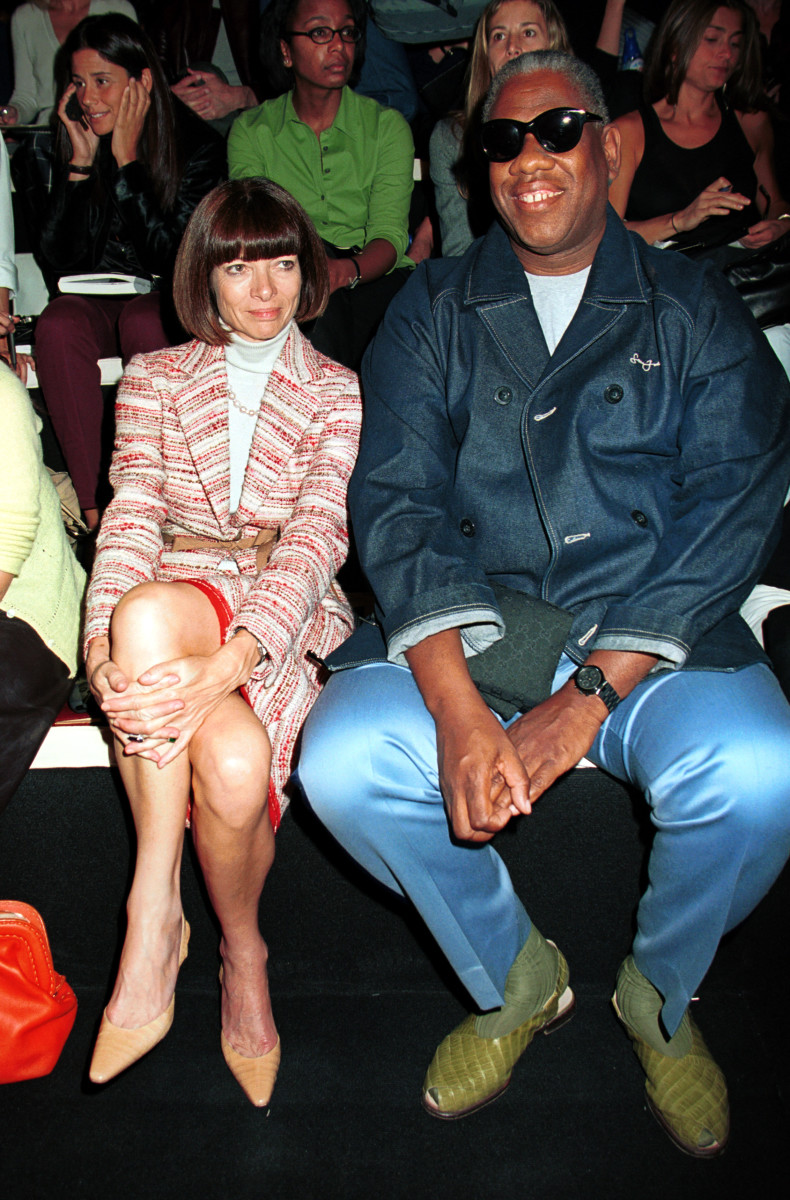André Leon Talley was great at drawing people into the world of fashion. In effect, that was his job. I grew up in the '90s flipping through my mom's issues of
Vogue, and as I got older I became increasingly obsessed with Talley's columns — colorful dispatches from European film festivals, iconic runway shows and exciting run-ins with celebrities. I was less interested in the clothes in the magazine than I was in the people and the world behind them. His writing was engaging, joyful and a little gossip-y, but also thoughtful, beautiful and substantive. It stood in contrast to the more solemn, jaded, sometimes condescending tone of most fashion writing; there was an accessibility in his passion and openness. He peeled back the curtain just enough for a nobody like me to at least picture myself one day existing behind it.
That's just one of the ways Talley, who passed away on Jan. 18 at age 73, inspired a generation of fashion editorial professionals who may not have seen a path for themselves in the industry if he hadn't paved his own.
"He gave fashion editors permission to take themselves and their work seriously, but in a way that did not have to be self-conscious and joyless," Eric Darnell Pritchard, award-winning author of "Fashioning Lives: Black Queers and the Politics of Literacy" and self-described writer, teacher, scholar and alchemist, writes to me in an email. "That is, his unapologetic display of genius set the bar for the following generations of fashion editors to treat fashion as both an intellectual and creative endeavor that could emerge from and spark deep thought and joy simultaneously."
"It was always the way he spoke about fashion that I admired," echoed freelance fashion and beauty editor Shelby Ying Hyde. "He never, at least outwardly, let the politics of it all dim the passion he had for his craft."
Talley was, of course, one of the first and few Black people to ascend the historically exclusive fashion media ranks at the time. He didn't have the typical fashion-world pedigree, having grown up in the segregated South and studied at an HBCU, and that undoubtedly shaped his perspective on the glamorous world he'd once dreamt of infiltrating. For those with similar backgrounds, his existence made working in fashion feel at least somewhat achievable.
"Seeing someone Black and Southern take up such a huge space in fashion meant something to me," says Shelby Ivey Christie, a fashion and costume historian, who once worked at Vogue. "I knew I was standing on the shoulders of ALT and could only be in that space because of the foundation he'd laid."
Beyond existing, Talley made his presence known at every milepost on his career journey. Thanks in part to his magnetic, outsized personality and flamboyant personal style, he became a beloved public figure — the convivial man towering over Anna Wintour in the front row. And unlike most of his seatmates, he was not white, not straight, not thin, and did not come from wealth and privilege. He would have stood out whether he wanted to or not. But, importantly, he leaned into his uniqueness.
"André Leon Talley's presence was, for me, a child-turned-teenage fashion nerd, an affirmation that my wholehearted love of fashion, history and image craft was more than a whimsical predilection for the sublime that was wasting time and would lead to nowhere," explains Pritchard. To him, Talley's presence said: "'Yes, this thing you adore, that, to some, makes you strange, has a destination that can make you happy. Yes, some may say you are too much, and expect you to make yourself small as a condition of acceptance and even a modicum of safety as a queer youth who was different, but authenticity has its rewards. Yes, the living library of cultural history, the smartest person in the room, not only can be but already is, in fact, a Black person.'"
Over time, Talley's visibility and renown continued to grow; in addition to publishing two memoirs, he appeared in 2009's "The September Issue" and, in 2017, his own documentary, "The Gospel According to André." He also frequently appeared on talk shows, and judged on "America's Next Top Model."
Amira Rasool, founder and CEO of The Folklore, a luxury e-commerce platform for African fashion brands, began her fashion career as a writer and editor. As a teenager, she became aware of Talley via "The September Issue."
"Witnessing the creative impact that he made at Vogue, the manner in which he carried himself and the respect he garnered made me know that it was possible for me to thrive in this type of environment," she tells me. "Talley's mere presence at Vogue was an act of rebellion, and, as a self-proclaimed teenage rebel myself, I knew I wanted to be a part of this rebellious movement. Without seeing Talley in that film, I'm not sure if I would have dreamed big enough to ever think I would have a Vogue.com byline only two years out of college."

Talley with Edward Enninful in 2018
Photo: Dimitrios Kambouris/MG18/Getty Images for The Met Museum/Vogue
Recommended Articles
It would not be an exaggeration to say that the most prominent Black fashion editors and journalists working today may not be where they are without him. Immediately following his death, many took to social media to credit him with paving the way.
"Without you, there would be no me," wrote British Vogue Editor-in-Chief Edward Enninful. "André Leon Talley walked so I could run," tweetedGQ France's Head of Editorial Content Pierre A. M'Pelé, a.k.a. Pam Boy. "For all of the Black kids who wanted to see themselves in fashion, André was a constant beacon of hope," wrote stylist and fashion editor Gabriella Karefa-Johnson, who in 2021 became the first Black woman to style a Vogue cover. "It was impossible not to aspire to be just like him: uncompromising, brilliant, supremely and multi-talented."
Of course, like most trailblazers, Talley didn't exactly arrive at the top of the fashion-industry hierarchy unscathed. He opened up about the discrimination and bigotry he encountered along the way in 2020's "The Chiffon Trenches: A Memoir." While disheartening, these stories showed how perseverant he was, on top of everything else — that he was able to achieve so much and express himself so unapologetically while repeatedly having to prove his worth behind the scenes. "You don't get up and say, 'Look, I'm Black and I'm proud,'" he wrote. "You just do it and it impacts the culture.”
"I'm not exaggerating when I say that much of my survival in the publishing industry is because of André," says Cosmopolitan Beauty Director Julee Wilson, who worked with him during a fellowship. "André showed us (Black and brown people) that in spite of the tokenism, disrespect and struggle we might go through, we can still soar and etch a legacy, however big or small."
Talley's race was certainly not the only reason he inspired us, but, due to prejudice, it did hold him back and make his life more difficult and lonely. And while that prejudice certainly hasn't disappeared, the hopeful outcome is that subsequent generations don't have to spend as much of their time and energy fighting against it. As Pritchard puts it, "He made a way for those coming after him to just do their work."
Those who have followed in Talley's expansive footsteps innately understand their responsibility, and the fashion editorial landscape will continue to grow more diverse as a result.
"I think a lesson I heeded from his journey is how important community amongst other creatives — particularly Black creatives — is," notes Christie. "It's important to support and work with your peers."
"For Black fashion editors and cultural critics, he presented one way to leverage whatever influence they had with their role to create more space and address long practices of exclusion, while also creating a path where there is room for subsequent generations to apply different tactics toward the same ends as well," shares Pritchard.
Of course, fashion professionals of all races should learn from Talley's life and legacy, and build on it. As for a place to start? "We can ask ourselves how far we might already be on matters of equity, inclusion and justice if [Talley] had been able to do all the things he said he wanted to do with ease and aplomb, sit in the discomfort that comes with the response, and then go do the work so we don't ever have to ask that question about the next trailblazer who becomes an ancestor," offers Pritchard.
It was only a couple of years ago that the industry finally started to recognize its failures in addressing systematic racism within its institutions, and serious conversations picked up around creating more opportunities for underrepresented groups. But Pritchard points out that writers and editors are often left out of them, arguing that more could be done to support those who aspire to more journalistic roles, specifically.
Obviously Talley wasn't just a trailblazer. His career achievements, knowledge, insight, passion, generosity and way with words were all remarkable and worthy of recognition — more recognition than he ultimately received — independent of his appearance or background. The void he leaves behind is massive, but even though there's more work to do, part of his legacy is the community of talented, hardworking people able to fill it.
Never miss the latest fashion industry news. Sign up for the Fashionista daily newsletter.

